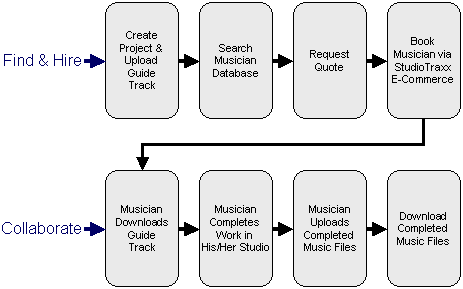What Are Music “Work-For-Hire” Agreements?
 According to the United States Copyright Act [17 USC Sec. 102], an author enjoys copyright protection as soon as he/she “fixes” his/her original work in a “tangible medium of expression” (for example by writing it down or recording it).
According to the United States Copyright Act [17 USC Sec. 102], an author enjoys copyright protection as soon as he/she “fixes” his/her original work in a “tangible medium of expression” (for example by writing it down or recording it).
The same principle applies, however, for independent contractors (artists, back-up musicians, back-up vocalists, etc.) who are hired to contribute to larger productions.
What does that mean?
Well, artists, that means that even though you pay the back-up singers on your tracks, or the graphic designers, video editors, and web developers to help package your branding tools, each contributor continues to have ownership in whatever original work they’ve created. Just because you’ve paid for a service does not mean that you own the product or the money you make from it (what we lawyers call “results and proceeds”)! We imagine at this point that you’ve probably become concerned about how you can own all of the content on your tracks – unless you do everything yourself. Well, fret not- Work-For-Hire Agreements remedy that exact predicament.
Work-For-Hires will allow for anybody else’s work to be treated as if it were “authored” by the hiring party. In other words, where a true employer-employee relationship does not exist (which it almost never does in music), this document will secure ownership in intellectual property for the hiring party. What is more, a thorough Work-for-Hire Agreement (which are usually only one page) will have a catchall clause that transfers ownership even if the actual content-at-issue does not fit neatly within the Copyright Act’s definition of “works-made-for-hire.” Thus, a well-drafted Agreement works on two fronts, providing both “belt and suspenders.”
As a practical matter, Work-For-Hires ensure a clear “chain of title” for the hiring party, and minimize that party’s exposure to liability from other creative people; the latter will not be able to sue the hiring party for additional compensation or control of the work-at-issue, because the latter will have no legal “ownership” of that work. Finally, a Work-for-Hire will clearly delineate how the creative contributor will be compensated. One single-page document can make things that much easier and clearer. Artists, please consider these Agreements seriously in moving forward with your creative endeavors. They are a cheap, excellent means of preempting very expensive problems down the line.
By: Barry Chase, Greg Bloom, and Michael Epstein.
Entertainment Attorneys at Chase Lawyers.
Miami : 305-373-7665 | New York City: 212-601-2762
www.ChaseLawyers.com.



